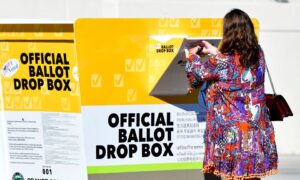A new California law requiring credit card companies to track firearms and ammunition sales went into effect on July 1.
The new law requires banks and credit card companies to implement a merchant category code for California businesses that have, or are expected to have, the highest sales volume of firearms, gun accessories, or ammunition in the state.
Gun retailers have until May 2025 to integrate the codes into their sales systems.
The codes will allow banks and credit card companies to flag suspicious purchases, according to Assemblyman Philip Ting, the measure’s author.
“Financial institutions can now be a part of our [gun-tracking] efforts since they are in a unique position to notice buying patterns that no one else can,” Mr. Ting said in a statement on June 25. “When stockpiling of firearms and ammunition appears to take place, alerting authorities can be instrumental in helping California prevent tragedies and save lives.”
The new law, Assembly Bill 1587, which was approved last year, will require four-digit codes to be used in firearms sales, similar to how they are used to track travel, restaurants, groceries, and other items.
Guns Down America, a national group that calls for dramatically fewer guns in the United States and for making them harder to purchase, has pushed for new state and national gun laws that include sales tracking codes.
Colorado and New York also passed firearms code mandates that will take effect in May 2025.
“The gun industry should not be exempt from the same rules and standards that apply practically everywhere else, from grocery stores to churches,” Guns Down America Executive Director Hudson Munoz, said in a February statement. “A merchant category code for gun stores only has upsides for the financial industry, consumers, and most importantly, the safety and common good of the public.”
Gun rights organizations have spoken out against the use of merchant codes for firearms purchases.
The National Rifle Association (NRA) called the practice “dangerous,” saying states will use the code to enact further gun control.
“Collecting firearm retailer financial transaction data amounts to surveillance and registration of law-abiding gun owners,” the NRA said in an online publication in July 2023. “Those proposing this scheme are proponents of firearm and gun owner registration and advocate against firearm owners’ privacy.”
The NRA additionally said previously the organization was exploring and pursuing legal challenges after the law was signed by Gov. Gavin Newsom in September 2023. It’s unclear if the NRA has filed any court action against the measure.
The California Rifle and Pistol Association, which advocates for firearms policies that strengthen gun owners’ rights, opposed the law during the legislative process last year, saying it would not provide the government with any additional data to solve crimes.
The Department of Justice “will gain no new data that it does not already possess in the status quo through firearms and ammunition purchase,” the association wrote about the law in 2023, according to a legislative analysis. “Given the fact that [merchant codes] will not provide any additional information to solve crimes, it appears that the intent is focused on placing law-abiding citizens in harm’s way.”
The association also claims the new system could affect parents in unintended ways.
“Imagine a parent supporting their child by making a purchase of shotgun ammunition for competitive shooting at the range and having a completely unwarranted visitation by [Department of Justice] agents for doing nothing illegal,” the association added.
The association has tens of thousands of members in the state.
Meanwhile, laws in 14 states—including Georgia, Tennessee, and Iowa—ban the use of such codes in gun shops.














